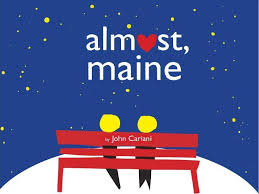 Earlier this month, the administration at Maiden High School in Maiden, North Carolina tried to put a stop to the student production of John Cariani’s Almost, Maine. With permission slips in hand, the cast chosen and rehearsals just underway, the school announced the show was off. But it’s only off school grounds. The play will go on.
Earlier this month, the administration at Maiden High School in Maiden, North Carolina tried to put a stop to the student production of John Cariani’s Almost, Maine. With permission slips in hand, the cast chosen and rehearsals just underway, the school announced the show was off. But it’s only off school grounds. The play will go on.
* * *
As first reported last week by WSOC TV in two reports [here and here], with additional reporting from Think Progress, Almost, Maine was shuttered because of a single scene, entitled “They Fell,” in which two buddies reach the startling discovery that they love one another – by actually falling down. Repeatedly. There’s no sexual innuendo, no physical contact, and the words “gay” and “homosexual” aren’t spoken. The scene takes up six pages of a 54 page text.
It’s not as if the school didn’t know the play was in the works. Maiden High School junior Conner Baker, who was to direct the production, said that when the administration was asked for permission, they gave it within a day.
“Our teacher advisor spoke to our principal,” said Baker, “who then spoke to the superintendent. We were told through our student advisor.”
She explained that students had to get permission slips with parents expressly agreeing to let their children participate, which hadn’t happened before in her experience. Of the permission slip, she said, “I don’t remember it word for word. It was along the lines of, ‘We have chosen Almost, Maine as our fall play this year. The play includes nine vignettes about love, one of which is centered around two male best friends who realize they are in love with each other’.”
Baker also described parents being required to come to one of two meetings in person to give their approval, also a new requirement. “Whenever a parent came in, I explained to them the content of the play and told them that for their child to audition, they needed to sign the permission slip.” Students also were permitted to audition with the scene in question, but Baker said she didn’t know where that requirement came from. “We were told by our teacher, though I know it wasn’t her decision. I also do not know why.”
After the show was cast and had just begun rehearsals, the word came that the show was off. “We were told by our teacher. They said the community isn’t ready for it. There wasn’t really a big discussion about it.”
* * *
In spite of all the strictures placed on the audition process – the permission slips, parents coming to meetings – the school’s statement, issued after the news media began to pick up the story, clearly sought to obfuscate the issue, using the ‘approval hadn’t been given’ excuse that crops up so regularly in instances of school theatre censorship. Issued by Principal Rob Bliss (Robert_Bliss@catawbaschools.net) , it read:
“Our faculty and staff are still in review of potential performances to be conducted by our students this fall. At this time, no final decision has been made regarding whether and what drama performances are to be presented this fall. In regards to the request for students to perform the play “Almost Maine,” careful review and consideration was given to the contents of this play. The play contained sexually-explicit overtones and multiple sexual innuendos that are not aligned with our mission and educational objectives.
“As principal of Maiden High School, I have an obligation to ensure that all material, including drama performances is appropriate and educationally sound for students of all ages.”
The consensus in conversations on Facebook between various students was that some adults and churches in the area had made their displeasure known to the school administration, focusing on the gay storyline. None of them appear to have made their concerns known publicly. Yet this prompted the school to pull the plug without giving any hearing to those in support of the play.
* * *
Upon learning about the cancelation, one area adult, Carmen Eckard, a former local teacher, sent an e-mail to a number of administrators at the school. She wrote, in part:
“These kids have spent years fostering their love of theatre. In fact, I taught many of them at Startown Elementary, and they loved theatre class! That has blossomed into a real appreciation and dedication, and the decision to cancel a play after rehearsals had begun is extraordinarily disrespectful, and counterintuitive to education.
“Their passion is now spurred, and they will show you how dedicated they are. I’m sure you’ll quickly realize that a mistake has been made.
“My advice would be to reinstate the play, before Huffington Post picks up this story. It’s just the kind of thing they love, and I’m sure we’ll all appreciate not being highlighted in national news as a ‘backwards’ town, again.”
She received a response from the school superintendent Dr. Dan Brigman (dan_brigman@catawbaschools.net), who thanked her for writing, but didn’t address Almost, Maine at all, simply saying another appropriate play would be found. [For legal reasons, I am paraphrasing the superintendent’s brief reply.]
It seems a shame that Brigman didn’t heed Eckard’s warning, given the media attention that has resulted from the cancelation (even reaching up into Maine). As for being highlighted in the national news “again,” while I didn’t ask Eckard what she was referring to specifically, I am assuming it was the 2012 stories about local Pastor Charles Worley of the Providence Road Baptist Church in Maiden. Worley got lots of press, far beyond HuffPo, for stating that gays and lesbians should be confined behind an electrified fence. Plenty of North Carolinians spoke out against Worley at the time, but his church remains active in the community.
* * *
Eckard did more than just write a letter. She got involved.
“As soon as I realized that it was my old students and the play was Almost, Maine, I started looking for ways to help,” she wrote in an e-mail. “By Friday, Connor and I had scheduled a meeting, and people had started contacting both of us, asking for ways to help.”
In my very first communications with Baker and Eckard, both immediately said they hoped to try to do the play off-campus, so I asked them both whether they considered fighting the decision.
Referring to the response she received from the principal, Eckard continued, “The response I received convinced me pretty thoroughly that trying to change the ruling would be a waste of time. It also gives the power in the situation completely to the school board – it’s their decision. The community is extraordinarily conservative.”
Conner Baker said, “I think at first we considered that, but as a group, we just want to do what’s best for us. Our whole reasoning behind speaking out was to be able to do the show.”
While many outside groups and individuals offered their support, Baker and Eckard felt it was best not to be antagonistic as they went forward.
Eckard explained, “The kids said, ‘The main thing we want to do is that we don’t want to alienate the community, we want to keep things positive. We’re going to take our play somewhere else for people who want to see it.’ I think this way will make people happy-ish.”
* * *
Before learning that the show might go on off-campus, playwright John Cariani learned of the situation in Maiden and crafted a reply that was posted to the Almost, Maine Facebook page. It read, in part:
“If Maiden High School administrators take issue with ‘They Fell’ because it’s about two young men who are simply stating their feelings for one another, they are calling into question the validity of same-sex love by making it seem wrong and different and other. They are allowing a dangerous cycle of fear and self-hatred among LGBTQ youth to continue, and, consequently, they are tacitly promoting homophobia. This is simply not necessary. Nor is it helpful. We don’t need any more Tyler Clementis or Jamey Rodemeyers and Jamey Hubleys. We need kids to know that it’ll “get better.” Falling in love is tough enough when you’re young. Let’s remove the stigma of falling in love with someone of the same sex…
“By canceling the play, it seems to me that school officials are pleasing parents and pillars of the community rather than serving the students. I think there’s a better solution than to stop the production.”
In a phone conversation, I asked Cariani if he had originally conceived of his play being performed by high schools, where it is enormously popular, landing as number one on the Educational Theatre Association’s list of the most produced plays in high school theatre this year. (You can see a list of upcoming productions by searching on the Dramatists Play Service website’s Page to Stage page.)
“Not at all,” he replied. “I thought it was a play for adults. The first high school production was Cape Elizabeth High School in Maine. They were a great theatre program when I was growing up [also in Maine, but in another school system]. Their teacher approached me and I thought, ‘High school students can’t do this play.’ But I got to see their production. The teacher helped me to understand that high school kids are on the verge of adulthood, but still optimistic of what the world can do for them and what they can do for the world. That is what makes high school kids, when they do it well, do it super-well.”
Cariani said he knew of a couple of instances in the past where there were efforts to censor or cancel the play. He noted one at Bel Air High in Maryland where the American Civil Liberties Union was instrumental in insuring the play went on. He also echoed Baker and Eckard’s sentiments about how to go forward.
“It’s important that we achieve our goals without being mean,” he offered. “It’s dangerous.”
But, I wondered, given the countless productions around the country, wasn’t it possible that some school might have already done, or might be planning to do, the show and altering “They Fell” unilaterally? What would he like to say to anyone who has done that or contemplates that, against the legal contract of the license and copyright law?
“It’s lying,” said Cariani, “because that’s not the play.”
* * *

Some of the Maiden High Students who will continue to work on Almost, Maine (Photo by Eckard Photographic)
Last night, October 20, Baker and Eckard held a small meeting to begin organizing the play for production away from Maiden High School, discussing possible venues, budgets and timing.
I asked Baker whether she thought she might lose any of her cast, since the show is no longer a school activity, especially because the school has already begun surveying students as to their interest in participating in an alternate play under official auspices.
“Only one person for sure said they couldn’t do it anymore,” she replied. “But the show really is meant for four actors and we have a cast of 20, so even if half of them dropped out, we could still do it.”
Maiden senior Logan Riley wrote to me, regarding the school’s effort to mount its own show, “The school system wants to have another show to settle the unrest in the community. This does not mean that we will actually put on another show.”
Moving the play off school grounds could still result in opposition. Are either Baker or Eckard concerned?
“We don’t care if they oppose it,” said Eckard. “Free speech! It won’t matter if they are against a public performance, because those of us involved aren’t under any particular employment or jurisdiction that would cause us to fear retribution.”
Baker echoed the sentiment. “I mean, people will complain no matter where we perform it. We aren’t forcing anyone to come out and see it, but if people do protest, it won’t stop us from performing it.
* * *
So the students of Maiden High School are going forward with Almost, Maine, targeting the first weekend in January for production. They’ve set up a Kickstarter page to raise the funds they need and hope to confirm a location shortly. Their cleverly named website-to-be is www.almost maiden.com.
This isn’t the first time students have taken a show off of school grounds to get it done (there are many precedents, including Wilton CT and La Grande OR) and one has to applaud the Maiden students’ commitment to seeing the show happen, with its myriad messages of love intact. I have to confess to feeling that the school is getting off easy, since the relocated production also shifts the spotlight off of their efforts to silence the students and the play, leaving intact the utterly unacceptable official message that LGBTQ love is something to be hidden away – even as North Carolina begins legal same sex marriages.
But Conner Baker has a simple reason for how the play will now happen, and it’s pretty hard to argue against.
“We aren’t doing it to upset anyone,” she says. “We just want to do what we love doing.”






